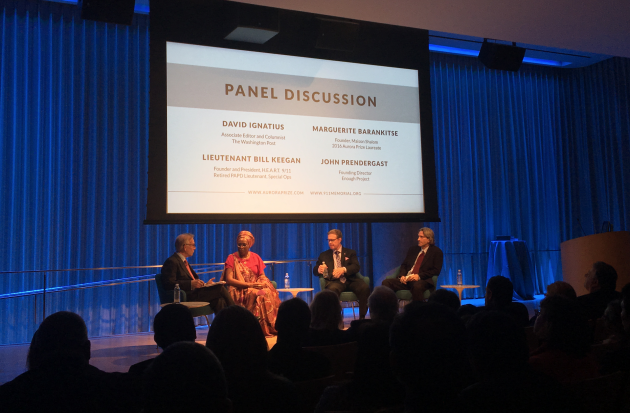From left to right: David Ignatius, Marguerite Barankitse, Lieutenant Bill Keegan, John Prendergast (Photo: Karine Vann/The Armenian Weekly)
NEW YORK—On March 1, The Aurora Humanitarian Initiative, in partnership with the National September 11 Memorial and Museum, hosted distinguished members of the humanitarian community for talks and a panel discussion during this year’s Aurora Dialogues event. In past years, the Aurora Dialogues have taken place in various locations in Armenia, as well as in Berlin, Germany. This was its first time taking place in the United States.
The event was titled “Solidarity Beyond Borders: Stepping Up When Others Step Back,” and focused on what moves people to risk their lives and stand up for others in challenging situations. The Dialogues began with words from Aurora Humanitarian Initiative co-founder Vartan Gregorian and National September 11 Memorial and Museum President and CEO Alice Greenwald.
“We are honored to join the Aurora Humanitarian Initiative in promoting the generosity of the human spirit, as this is also a positive legacy of the September 11, 2001 attacks,” said Greenwald in her opening remark, “These stories should be celebrated, and demonstrate that, when the times require, human decency will ultimately triumph over human depravity.”
Attendees to the event were greeted to the museum with a guided tour, where they experienced the exhibit, which consists of more than 900 personal and monumental objects and a collection that includes more than 60,000 items that present intimate stories of loss, compassion, reckoning and recovery linked to the events of 9/11 and the aftermath. Located on eight of the 16 acres of the World Trade Center site, the Memorial and Museum remember and honor the 2,983 people who were killed in the horrific attacks of September 11, 2001 and February 26, 1993. The Museum also explores the global impact of 9/11 and its continuing significance through education programs, public programs, live talks and film features that cover contemporary topics designed for diverse audiences. For more information or to reserve a ticket to the 9/11 Memorial Museum, please visit 911memorial.org.
The Aurora Dialogues’ first presentation was given by world-renowned psychologist and Professor Emeritus at Stanford University, Dr. Philip Zimbardo, whose landmark psychological experiment in 1971 into the , launched a worldwide conversation into the capacity of ordinary people to commit acts of evil and has inspired an award-winning movie, a New York Times bestseller, and a documentary DVD. Dr. Zimbardo spoke at-length about his more recent project, the Heroic Imagination Project, a non-profit organization dedicated to promoting heroism in everyday life.
The panel discussion was moderated by Washington Post Columnist and Associate Editor, David Ignatius. The panelists included 2016 Aurora Prize Laureate Marguerite “Maggy” Barankitse, who spoke about her traumatic experiences during the Burundian civil war, where she, a Tutsi, tried to hide 72 of her closest Hutu neighbors to keep them safe from persecution and was forced to watch as her neighbors were discovered and executed. She received the award in 2016 for her humanitarian work in spite of the horror she experienced. Focusing on youth to “build a new generation,” Barankitse has saved roughly 30,000 children as the founder of Maison Shalom, a children’s home and support center, and treated more than 80,000 patients by founding the REMA Hospital in 2008.
The panel also featured Lieutenant Bill Keegan, Retired Port Authority Police Department Lieutenant, Special Ops, who was Night Operations Commander of the World Trade Center Rescue/Recovery Teams at Ground Zero from September 11, 2001 until the end of the recovery, which was marked on May 30, 2002 when the last steel column from the original World Trade Center was ceremoniously removed. He spoke about the recovering the victims and sustaining the recovery teams’ mission of compassion and selflessness through his organization H.E.A.R.T. 9/11, which utilizes first responders’ skills to respond to contemporary disasters and rebuild in hard-hit areas.
The third panelist was human rights activist and Enough Project Founding Director, John Prendergast, who discussed his work utilizing the influence of modern celebrities in focusing global attention on humanitarian crises. Prendergast has also worked closely with celebrities like Angelina Jolie, George Clooney, and Don Cheadle to put an end to mass atrocities in Africa’s deadliest conflict zones.
At the end of the event, guests were offered a free copy of a recently published book titled “Armenian Legacy of America: 400-years Heritage,” by Hayk Demoyan, the director of the Armenian Genocide Museum-Institute. The book, which is dedicated to the 400th anniversary of the arrival of the first Armenian to America“Martin the Armenian” (Virginia, 1618), contains more than 2000 images of artifacts, documents and rare photos showing the history and legacy of the Armenian-American community. Most of the materials and visual data were being published for the first time. The book was published through the generous support of the Noubar and Anna Afeyan Foundation on behalf of the Aurora Humanitarian Initiative.
Founded on behalf of the survivors of the Armenian Genocide and in gratitude to their saviors, the Aurora Humanitarian Initiative is an eight-year commitment (2015 to 2023, in remembrance of the eight years of the Armenian Genocide 1915-1923) to support people and promote global projects that tackle the needs of the most helpless and destitute and do so at great risk. The Initiative is the vision of philanthropists Vartan Gregorian, Noubar Afeyan and Ruben Vardanyan who have been joined by more than two hundred new supporters and partners.
The next Aurora Dialogues is slated to take place in Moscow this April leading up to the annual Aurora Dialogues in Yerevan this June as part of a weekend of events culminating in the presentation of the 2018 Aurora Prize for Awakening Humanity – a $1 million award honoring those who risk themselves for the benefit of others.

